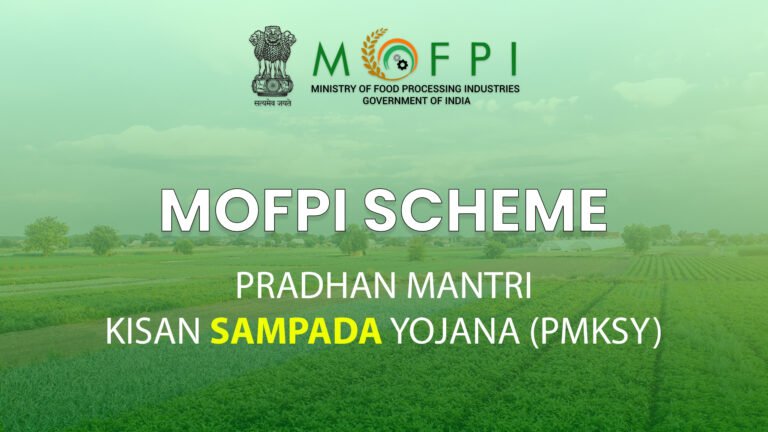India’s food processing sector just received a major boost as the government approved an additional ₹1,920 crore under the “Pradhan Mantri Kisan Sampada Yojana (PMKSY)”. With this, the total outlay under the 15th Finance Commission cycle (2021–22 to 2025–26) has reached ₹6,520 crore. This move is expected to strengthen agri-infrastructure, reduce food wastage, and improve income for millions of farmers across the country.
Why Pradhan Mantri Kisan Sampada Yojana Matters
The Pradhan Mantri Kisan Sampada Yojana is a flagship scheme that aims to create modern infrastructure for food processing, ensure effective linkages between farmers and markets, and promote value addition in the agriculture sector. By doing so, it not only increases price realization for farmers but also reduces post-harvest losses and generates employment in rural areas.
Launched in 2017 (originally called SAMPADA), the scheme was rebranded and expanded to bring food processing infrastructure into the spotlight. In the current cycle, 1,601 projects have been approved, out of which 1,133 are already operational. These projects have a total processing capacity of 255.66 lakh metric tonnes per year and have attracted investments worth ₹21,803.19 crore, benefiting over 50 lakh farmers.
Major Financial Boosts Under PMKSY
The recently approved ₹1,920 crore will be used in the following key areas:
₹1,000 crore for setting up:
50 Multi-Product Food Irradiation Units under Integrated Cold Chain and Value Addition Infrastructure (ICCVAI)
100 NABL-accredited Food Testing Laboratories under the Food Safety and Quality Assurance Infrastructure (FSQAI) scheme
₹920 crore for ongoing PMKSY component schemes such as cold chains, food parks, and agro-processing clusters
This investment aims to enhance food quality, improve preservation, and ensure compliance with safety standards—boosting both domestic sales and exports.
PMKSY’s Core Objectives
The objectives of PMKSY include:
- Building modern food processing infrastructure including mega food parks and agro-processing clusters
- Establishing backward and forward linkages to connect farmers, processors, and markets
- Creating a robust cold chain and supply system to minimize post-harvest losses
These efforts align with the government’s broader vision of doubling farmers’ income and promoting sustainable agriculture.
Sectoral Impact of Food Processing
Food processing contributes significantly to the Indian economy. As of 2023–24, it accounted for:
- 1.39% of total Gross Value Added (GVA)
- 7.93% of GVA in manufacturing
- 9.46% of GVA in agriculture
In fact, the sector’s GVA rose from ₹1.30 lakh crore in 2013–14 to ₹2.24 lakh crore in 2023–24. This growth clearly signals the potential and importance of focused schemes like Pradhan Mantri Kisan Sampada Yojana.
Key Components Under PMKSY
To drive transformation in the food processing sector, several schemes are being implemented under PMKSY:
- Integrated Cold Chain & Value Addition Infrastructure: Creates uninterrupted cold chains from farm to retail
- Creation/Expansion of Food Processing Units: Supports new/existing units to improve shelf life and reduce wastage
- Infrastructure for Agro-Processing Clusters: Brings facilities closer to production hubs
- Food Safety & Quality Assurance Infrastructure: Builds testing labs to ensure global quality compliance
- Human Resources & Institutions: Encourages skill development and R&D in food processing
These components are strategically designed to make India a global hub for food processing.
Operation Greens: Extending Support to Perishables
In November 2018, the Operation Greens (OG) initiative was launched as part of PMKSY. Initially focusing on Tomato, Onion, and Potato (TOP), it was later expanded to cover 22 perishable items, including:
- 10 fruits like mango, banana, apple, grapes, and pomegranate
- 11 vegetables including peas, okra, garlic, and gourds
- 1 marine product: shrimp
OG provides support for transport, storage, and processing, helping stabilize prices and reduce wastage.
Food Irradiation Units and Food Testing Labs
Two standout initiatives under PMKSY are:
- Multi-Product Food Irradiation Units: These facilities help increase shelf life and ensure safety. 50 new units are expected to add 20–30 lakh metric tonnes of preservation capacity.
- Food Testing Labs: 100 NABL-accredited labs are being set up to ensure timely and accurate testing of food products. These labs play a critical role in ensuring that Indian food exports meet international standards.
Focus on Equity and Inclusion
PMKSY gives special attention to difficult regions and SC/ST communities. By setting up food processing units in remote areas, the scheme ensures that economic benefits are widely shared, and employment opportunities are created where they are most needed.
Conclusion: Securing India’s Agricultural Future
The Pradhan Mantri Kisan Sampada Yojana is not just another government scheme—it’s a transformative initiative for India’s agri-food ecosystem. By improving infrastructure, promoting value addition, and ensuring better market access for farmers, PMKSY addresses core challenges in Indian agriculture.
With increased investment, inclusive policies, and a strong focus on modern food processing, India is not only reducing agricultural losses but also unlocking new economic opportunities. The scheme is paving the way for a resilient and future-ready agriculture sector—one that benefits both farmers and consumers alike.
Read Also :-
What’s Changing in India’s Fertilizer Strategy 2025? Big Reforms Farmers Must Know!
Aadhaar Seeding and Digital Reforms in PM-KISAN Scheme: Empowering Farmers with Direct Support
Popularization of Ayurveda, Yoga, and Naturopathy: India’s Global Push for Holistic Health

